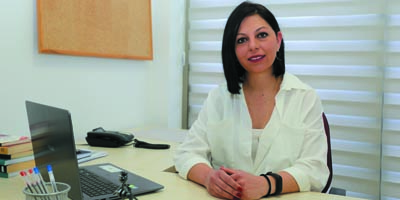EUL Academician Eğitmen discussed “The Importance of Newborn Hearing Screening”

European University of Lefke (EUL) Health Services Vocational School Audiometry Department Lecturer Specialist Audiologist Hatice Egitmen gave information on the “Importance of Newborn Hearing Screening”.
Saying, “The speech and language development of babies develops very rapidly, especially in the first months of life, in the first years of life,” Eğitmen continued her explanation as follows; A six-month-old baby is more interested in the sound of speech than in other sounds around him. When the baby is 18 months old, he can now form simple sentences. Having normal hearing in early infancy is extremely important in terms of social, emotional and mental development as well as speech and language development. For this reason, not being able to detect hearing loss in the early period, which is common among congenital (congenital) anomalies, causes a lifelong disability such as retardation in speech and language skills of the hearing-impaired child, weakness in academic performance, personal and social incompatibility, and emotional problems. Even having a moderate hearing loss of 35-40 dB without amplification with a hearing aid causes a child to miss 50% of daily conversations. Having severe and profound hearing loss hinders communication skills more seriously. Hearing loss; It can be defined as the situation where the hearing sensitivity of the individual prevents him from gaining development, adaptation and especially communication skills. Hearing loss, which can be at different levels from very mild to very severe, causes sensory deprivation as well as deterioration of communication skills, which turns into a learning problem.
Babies who are given special auditory training perform close to their peers in all areas of development and academic success.
Expressing that the development of technologies that will enable the early detection of hearing loss with objective test methods in infancy gives rise to the opportunity to detect congenital hearing loss in the first days/months of life, the Eğitmen said, stated that they can perform close to their peers in academic success.
In the continuation of her words, Eğitmen included the following statements; When the device is applied to babies who need hearing aids at the age of six months, their language and speech development develops better than babies who start using the device at a later age. Opinions on early diagnosis and the use of early hearing aids and the increase in the language development of hearing-impaired children and consequently their academic success have led to the creation of universal hearing screening methods. In universal newborn hearing screenings, performing a hearing test for all babies born in hospitals before discharge, completing the audiological evaluations within three months of babies who do not pass the test, making necessary interventions for the device and training for babies with hearing loss before they are six months old, It is adopted to continue the follow-up of infants. Generally, screening is done with the aim of detecting a particular disorder in a targeted population before it becomes symptomatic. The aim of screening is to separate the sick from the non-patient and to provide early treatment. Screening tests enable the diagnosis of diseases without symptoms and signs. For this reason, it is very important to apply screening programs in the neonatal period.
